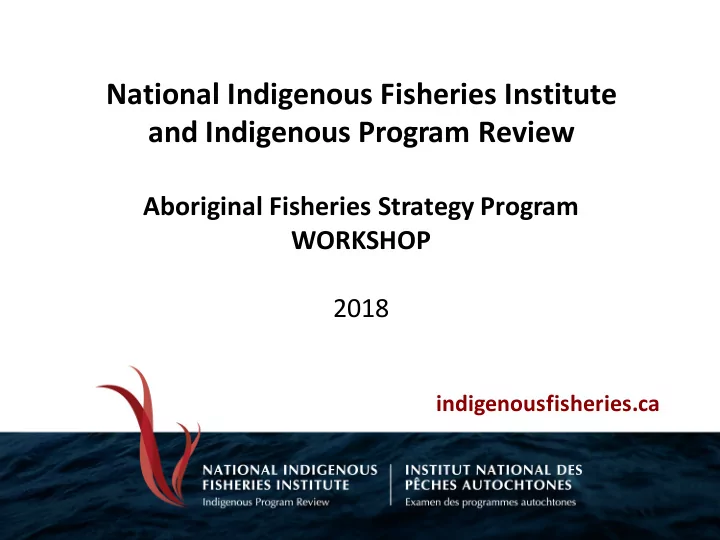

National Indigenous Fisheries Institute and Indigenous Program Review Aboriginal Fisheries Strategy Program WORKSHOP 2018 indigenousfisheries.ca www.Indigenousfisheries.ca
Our Agenda Today • Getting to know your community and its food−ceremonialfishery • Understanding the technical components of your agreement – Stock assessments, habitat restoration, fisheries enhancement – Monitoring catch and fishery, enforcing rules set for fishing • Understanding your relationships (Fisheries & Oceans and others) – Indigenous knowledge, data collected, and input in fisheries decisions – Links to your Aquatic Resource and Oceans Management group • Making program improvements – Success factors and community objectives to improve performance reporting – Training, skills development and careers 2 www.Indigenousfisheries.ca
About the Institute and the Indigenous Program Review 3 www.Indigenousfisheries.ca
National Indigenous Fisheries Institute • Technical organization began in May 2017 • Promote program design and development consistency across Fisheries and Oceans Canada’s Indigenous programs Indigenous Program Review first task – • Board of national and regional Indigenous executives Atlantic Policy Congress of First Nations Chiefs Secretariat – First Nations Fisheries Council of British Columbia – Nunavut Tunngavik Inc. – Assembly of First Nations – Ulnooweg Development Group – Kwikwasut’inuxw Haxwa’mis First Nation – Sahtu Region, Northwest Territories – 4 www.Indigenousfisheries.ca
Indigenous Program Review • Technical (not policy) review of a number of programs, including the Aboriginal Fisheries Strategy – Examined evaluations, audits, and departmental practises – Considered other interconnected federal Indigenous programming and relevant external reports – Findings used to develop a Discussion Paper on our website and to inform this workshop • Last year, engaged on Aquatic Resource and Oceans Management program, as well as integrated commercial fisheries initiatives – What we Heard reports produced after each session – Final report and recommendations show what to expect after this round of engagement 5 www.Indigenousfisheries.ca
Tell us about your community, food−ceremonial fishery, and experience with the Aboriginal Fisheries Strategy program 6 www.Indigenousfisheries.ca
26 year-old Aboriginal Fisheries Strategy • Your food−ceremonialfishery: – What species do you fish? – When does your food−ceremonialfishery begin/end/occur? – Where does it take place? – How many people fish in your community? – How is the food distributed? • Your agreement – When did you first sign an agreement? – Have you ever had years without an agreement? – What has changed since you signed on to the program? – What was its original intent / purpose? Is it still the same? 7 www.Indigenousfisheries.ca
Aboriginal Fisheries Strategy: Your Technical Activities 8 www.Indigenousfisheries.ca
Technical Components of Agreements • Technical activities – Data collection – Stock assessments – Habitat restoration – Fisheries enhancement – Catch and fishery monitoring – Enforcing rules set for fishing • Technical personnel – Field technicians – Fishery guardians (designated or not?) – Scientists (biologists, etc.) – Others? 9 www.Indigenousfisheries.ca
Exercise One: Technical Activities • Which activities do you do? – What activities are missing from this list? – Which activities would you like to be doing? – Are these activities meeting your community’s needs? • Who does these activities? • How do these activities link to the program objectives? – Orderly fishing for food, social and ceremonial purposes – Participate in fisheries management – Fisheries management skills and capacity • Are these activities in your agreement workplan? – Do your activities and/or agreement change every year? 10 www.Indigenousfisheries.ca
Your Relationship with Fisheries and Oceans Canada and Others 11 www.Indigenousfisheries.ca
Interaction and Info-Sharing 1. Who/how do you interact with Fisheries and Oceans Canada? – Program administrator – Science – Resource management – Conservation & Protection 2. Where does your data/information go at the Department? – Work plan reporting – Fish sampling, stock assessments, habitat monitoring – Catch data – Enforcement data 3. Do you work with other communities on technical projects? – Within an aquatic resource and oceans management group? 12 www.Indigenousfisheries.ca
Making Program Improvements 13 www.Indigenousfisheries.ca
Exercise Two: Improvements and Success 1. What are your priorities for your community’s fishery? – What message would you like to communicate to Fisheries and Oceans Canada? 2. Team capacity (job creation, training, professional development): What jobs would you like to see created in your community? – What training is needed? – 3. What is the most important way to improve the Aboriginal Fisheries Strategy program? 4. How would you measure the success of this program? 14 www.Indigenousfisheries.ca
Thank You for Participating! What Happens Next? 15 www.Indigenousfisheries.ca
Our Phase Two Timeline: At a Glance 16 www.Indigenousfisheries.ca
More Information • Institute website: indigenousfisheries.ca – Facebook (@indigenousfisheries) & Twitter (@indigenousfish) • Indigenous Program Review section – Discussion materials: guide, annexes and papers – Engagement activities: • Schedule of workshops, plenaries, and other engagement sessions (e.g., meetings where a presentation given) • Agendas of workshops • ‘What we Heard’ reports – Submissions received uploaded to website – Phase one final report • Institute contact information in discussion guide and online 17 www.Indigenousfisheries.ca
Recommendations: Active Implementation • Final Report Recommendations – How the change will be implemented • Co-delivery partners – This does not require Ministerial approval to go forward • How are we going to do this? – Solicit input as to how to achieve program changes in the recommendation report 18 www.Indigenousfisheries.ca
Recommend
More recommend